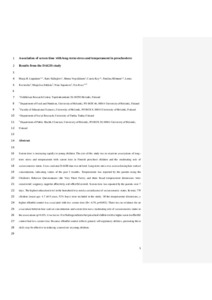Association of screen time with long-term stress and temperament in preschoolers: results from the DAGIS study
Leppänen M; Sääksjärvi K; Vepsäläinen H; Ray C; Hiltunen P; Koivusilta L; Erkkola M; Sajaniemi N; Roos E
https://urn.fi/URN:NBN:fi-fe2021042823396
Tiivistelmä
Screen time is increasing rapidly in young children. The aim of this
study was to examine associations of long-term stress and temperament
with screen time in Finnish preschool children and the moderating role
of socioeconomic status. Cross-sectional DAGIS data were utilized.
Long-term stress was assessed using hair cortisol concentration,
indicating values of the past 2 months. Temperament was reported by the
parents using the Children’s Behavior Questionnaire (the Very Short
Form), and three broad temperament dimensions were constructed:
surgency, negative affectivity, and effortful control. Screen time was
reported by the parents over 7 days. The highest education level in the
household was used as an indicator of socioeconomic status. In total,
779 children (mean age, 4.7 ± 0.9 years, 52% boys) were included in the
study. Of the temperament dimensions, a higher effortful control was
associated with less screen time (B = − 6.70, p = 0.002).
There was no evidence for an association between hair cortisol
concentration and screen time nor a moderating role of socioeconomic
status in the associations (p > 0.05).
Conclusion:
Our findings indicate that preschool children with a higher score in
effortful control had less screen time. Because effortful control
reflects general self-regulatory abilities, promoting these skills may
be effective in reducing screen time in young children.
Kokoelmat
- Rinnakkaistallenteet [29337]
